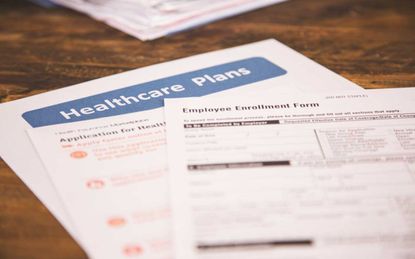
The added flexibility should help workers deal with unexpected medical and dependent care expenses from the coronavirus outbreak. But not every employee will benefit from the new IRS rules.
When you purchase through links on our site, we may earn an affiliate commission. Here’s how it works.

You probably never heard of COVID-19 when you picked this year's health insurance policy at work. You couldn't have planned for the coronavirus pandemic when you signed up for a 2020 flexible spending arrangement (FSA), either. But you might not be stuck with the choices you made in 2019 with respect to employer-provided health insurance and FSAs for 2020. That's because the IRS is letting workers make mid-year changes to their health insurance coverage and FSAs. It's also expanding FSA rules concerning carryover and grace periods.
But there's a catch: You can only take advantage of the new rules if your employer modifies its benefit plans. If your company doesn't want to make the necessary changes, then you're out of luck. But assuming your bosses are on board, here's a rundown of the mid-year health insurance changes allowed, the enhanced rules for FSAs, and even some adjustments that help people with health savings accounts (HSAs). Hopefully, the added flexibility will help if you're dealing with unexpected medical and dependent care expenses because of the coronavirus outbreak.

Normally, you can't change your employer-provided health insurance coverage during the year unless there's a qualifying "life event," such as a marriage, divorce, birth or adoption of a child, death of a covered family member, child turning 26, move to a new home, or change of employment status within the family. However, for many workers, the health insurance they signed up for last year isn't sufficient to handle unanticipated medical expenses linked to the coronavirus.
To help alleviate the problem, the IRS is allowing employers to modify their health benefit plans so that workers can make certain mid-year changes to their 2020 health insurance choices. Changes are only allowed on a prospective basis. Specifically, an employer, in its discretion, can amend its health plan to allow each employee to:
An employer is not required to allow all (or any) of these changes. It can pick and choose which of these new elections to offer. An employer can also limit health insurance changes to those that would increase or improve a worker's coverage (e.g., by electing to switch from self-only coverage to family coverage, or from a low-option plan covering in-network expenses only to a high-option plan covering expenses in or out of network).

Workers can also make mid-year changes to their health and dependent FSAs – again, if their employer modifies its FSA plan. Thanks to the IRS's blessing, employers can allow workers to:
As with mid-year changes to health insurance plans, employers can allow one, both or no changes. They can also limit mid-year elections based on FSA amounts that are already reimbursed.
Changes to FSAs are only permitted on a prospective basis, though. So, for example, you can't get back a contribution you already made.

FSAs generally operate under a "use-it-or-lose-it" rule: Use money contributed during the year to pay for qualifying expenses incurred that year or forfeit the unused funds. However, for health care FSAs, an employer can bend that rule a bit and allow workers to carryover up to $500 of unused contributions to the next year.
Employers now have the option of upping the carryover amount for 2020 FSAs to $550. This doesn't apply to amounts carried over from 2019 to 2020, though.
In addition, the carryover amount will be adjusted for inflation going forward.

Another way an employer can tweak the "use-it-or-lose-it" rule is by providing a grace period of up to 2½ months to incur health or dependent care expenses for the previous year. For example, if an employee had unused FSA funds at the end of 2019, the employer could allow the worker to use the money to pay for qualifying health or dependent care expenses incurred from January 1 to March 15, 2020. For health FSAs, an employer can adopt a carryover or a grace period (or neither), but it can't adopt both features.
For 2020, the IRS is letting employers extend the grace period to the end of the year. Again, it's optional, though. So, for example, if an employer sponsored a 2019 FSA with a grace period ending on March 15, 2020, it could amend its FSA plan to let workers to apply unused 2019 FSA funds to pay for qualifying expenses incurred through December 31, 2020. However, health FSA amounts can only be used for medical care expenses, and dependent care FSA amounts can only be used for dependent care expenses.
The extension of time for incurring claims is available to both FSAs that have a grace period and FSAs that offer a carryover.
Note, however, that a worker who had unused amounts from a 2019 health FSA and who is allowed an extension to the end of 2020 to incur expenses generally will not be allowed to contribute to a health savings account (HSA) during the extended period.